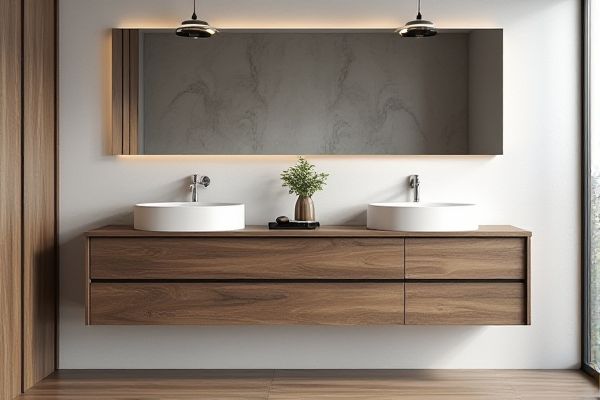
Wall-hung vanities offer a modern, space-saving design by mounting directly to the wall, creating an open floor area that's easier to clean, while console vanities provide a classic look with exposed legs and often feature additional storage options beneath the countertop. Discover which style suits Your bathroom's design and functional needs by reading the rest of the article.
Table of Comparison
| Feature | Wall-Hung Vanity | Console Vanity |
|---|---|---|
| Installation | Mounted directly on the wall | Freestanding with legs or open base |
| Space Saving | Maximizes floor space, easy cleaning | Less floor exposed, takes more space |
| Storage | Enclosed cabinets, hidden plumbing | Open shelving or minimal cabinets |
| Style | Modern, sleek, minimalistic | Traditional, open, airy |
| Accessibility | Adjustable height options | Fixed height, open legroom |
| Weight Support | Requires strong wall support | Supports weight independently |
| Cost | Often higher installation cost | Generally lower installation cost |
Introduction to Wall-Hung and Console Vanities
Wall-hung vanities are mounted directly on the wall, offering a sleek, modern look with open floor space that enhances bathroom accessibility and ease of cleaning. Console vanities feature a combination of a countertop supported by legs or a frame, blending traditional and contemporary styles while providing more visible legroom and an airy feel. Both designs maximize bathroom functionality and style, with wall-hung vanities emphasizing minimalism and console vanities highlighting structural elegance.
Key Design Differences
Wall-hung vanities are mounted directly to the wall, creating a floating effect that maximizes floor space and enhances a modern, sleek look. Console vanities incorporate legs or a frame that rest on the floor, offering a traditional or transitional style with added storage opportunities beneath the sink. Understanding these key design differences helps you choose a vanity that complements your bathroom's layout and aesthetic preferences.
Space Optimization and Bathroom Layout
Wall-hung vanities optimize space by creating an open floor area that enhances the perception of a larger bathroom, allowing for easier cleaning and improved accessibility. Console vanities, featuring open legs and shelves, provide additional storage without fully enclosing the base, which maintains visual openness while accommodating small bathrooms. Choosing between the two depends on bathroom layout, with wall-hung models favored for compact, modern designs and console vanities suited for more traditional or decorative spaces.
Installation Complexity and Requirements
Wall-hung vanities require professional installation involving secure wall mounting to support weight, often necessitating reinforced studs or additional bracing. Console vanities feature legs or pedestal supports, making installation simpler with minimal wall modification and easier adjustment for plumbing access. Understanding these differences aids in selecting a vanity that matches bathroom infrastructure and DIY skill level.
Aesthetics and Visual Appeal
Wall-hung vanities offer a sleek, modern aesthetic by creating an illusion of more space through their floated design, enhancing bathroom openness and light flow. Console vanities combine traditional charm with open legged frames that showcase flooring beneath, adding elegant visual depth and architectural interest. Both styles elevate bathroom aesthetics but cater to different design preferences: minimalist and contemporary for wall-hung versus classic and decorative for console vanities.
Storage Capabilities and Functionality
Wall-hung vanities provide efficient storage with enclosed cabinets and drawers, keeping bathroom essentials organized and out of sight, maximizing space in smaller rooms. Console vanities offer open shelving or minimal cabinetry, prioritizing aesthetics and easy access but with less concealed storage. Your choice depends on whether you prioritize hidden storage and clutter control or a more open, decorative functionality.
Cleaning and Maintenance Considerations
Wall-hung vanities offer easier floor cleaning and reduced dust buildup since they are elevated, preventing dirt from accumulating underneath. Console vanities, with their legs and open spaces, may require more frequent dusting and cleaning around the base. Your choice should consider how much time you want to spend on maintenance and whether accessible floor space is a priority for your cleaning routine.
Durability and Material Choices
Wall-hung vanities often feature solid wood or MDF with moisture-resistant finishes, providing strong durability and easy maintenance in modern bathrooms. Console vanities typically incorporate metal frames combined with wood or glass surfaces, offering a blend of durability and design flexibility. Material choices in wall-hung vanities prioritize moisture resistance, while console vanities emphasize structural support and aesthetic variety.
Cost Comparison and Budget Factors
Wall-hung vanities typically cost more than console vanities due to their complex installation and modern design, which requires reinforced wall support and professional labor. Console vanities offer a budget-friendly option with simpler setup and adaptable styles, making them ideal for cost-conscious renovations. Your choice depends on balancing upfront investment with long-term aesthetic value and bathroom space efficiency.
Which Vanity Style Suits Your Needs?
Wall-hung vanities maximize floor space and create a modern, minimalist look ideal for small bathrooms or those seeking easy cleaning. Console vanities offer an open, airy feel with visible legs and storage options underneath, perfect for traditional or transitional styles requiring extra storage flexibility. Choosing between these styles depends on your bathroom size, design preference, and functional storage needs.
 homyna.com
homyna.com